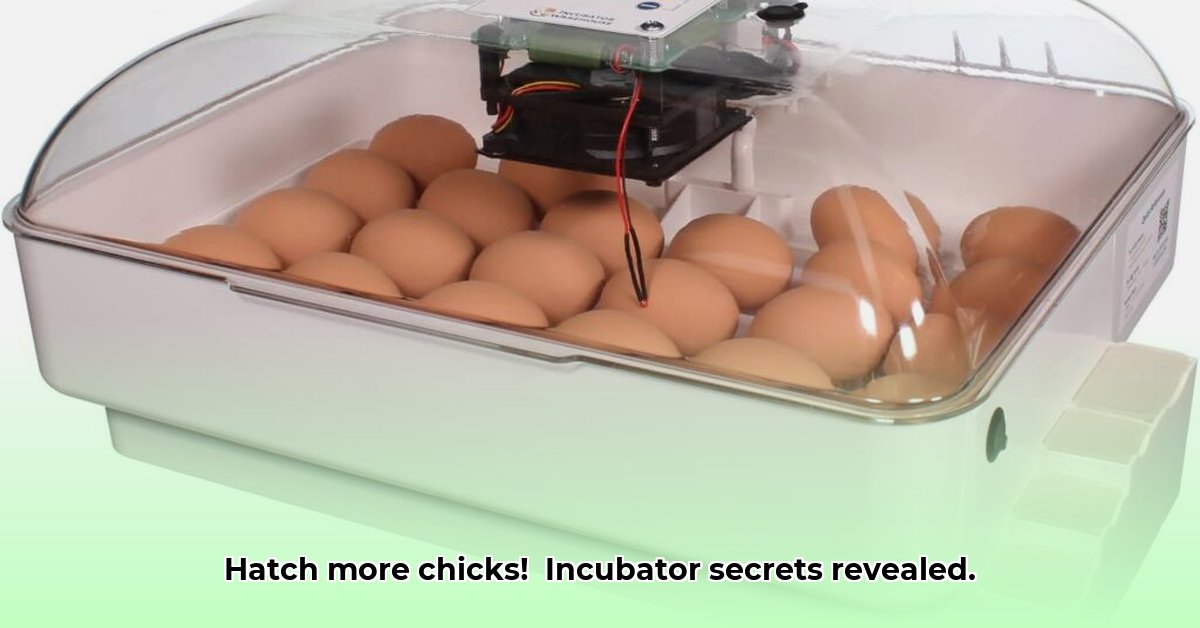
Want to maximize your chicken hatching success and embrace sustainable farming practices? Automated incubators are revolutionizing poultry farming, offering higher hatch rates and greater efficiency. This guide focuses on chicken egg incubators available at Tractor Supply, specifically highlighting the Cimuka 500, while exploring the broader implications of sustainable incubation. We'll cover everything from choosing the right incubator to minimizing your environmental impact. For more information on duck breeds, check out this helpful resource.
Automated Incubators: A Sustainable Farming Solution
Traditional methods of chicken hatching rely heavily on the hen, leading to inconsistent results and potential resource waste. Automated incubators provide precise control over temperature and humidity, crucial factors for successful hatching. This leads to significantly higher hatch rates, reducing wasted eggs and resources. Furthermore, improved biosecurity is a key benefit as incubators minimize the risk of disease transmission compared to relying on hen-laying. Isn't it time you considered this more efficient and sustainable approach?
Tractor Supply Incubators: Cimuka 500 and Beyond
Tractor Supply offers various incubators, catering to different farm sizes and budgets. Let's examine the popular Cimuka 500 and other options.
The Cimuka 500 Incubator:
Pros:
- Affordability: Generally a cost-effective option compared to larger models.
- Reliable Hatch Rates: Many users report high success rates.
- User-Friendly Controls: Simple operation, suitable for beginners and experienced farmers alike.
- Suitable Capacity: Adequate space for smaller to medium-sized flocks.
Cons:
- Limited Scalability: Not ideal for large-scale operations requiring higher egg capacity.
- Energy Consumption: While energy use is relatively low, it's a factor to consider, especially with rising energy costs.
Other Tractor Supply Incubators: Tractor Supply's selection varies. Before buying, compare specifications like capacity, automatic egg turning, temperature control precision, and energy efficiency to find the best fit for your needs and budget.
Sustainability in Chicken Egg Incubation: Reducing Your Footprint
While incubators boost efficiency, responsible farming requires mindful consideration of their environmental impact. The primary concern is electricity consumption. However, several strategies can mitigate this:
- Energy Efficiency: Use energy-efficient models and practices, such as properly insulating the incubator room.
- Renewable Energy: Explore using renewable energy sources like solar power to reduce your carbon footprint and operating costs.
- Waste Management: Composting eggshells reduces waste and provides valuable fertilizer.
How can you minimize your incubator's environmental impact and still enjoy higher hatch rates? Strategic planning and careful selection are key.
A Practical Guide for Farmers: Choosing, Setting Up, and Running Your Incubator
Successfully using an incubator involves careful planning and execution. Here's a step-by-step guide:
Choosing the Right Incubator: Assess your needs: flock size, budget, and access to reliable electricity. Select an incubator that aligns with your farm's scale and resources.
Incubator Setup: Follow the manufacturer's instructions diligently. Accurate temperature and humidity control are paramount. Regular monitoring is crucial for early problem detection. Ensure proper egg turning (manual or automatic) if required.
Financial Planning: Calculate the total cost—initial investment, ongoing electricity consumption, and maintenance. Consider potential increases in revenue from higher hatch rates to determine your return on investment (ROI).
Future Trends: Smart Incubators and Beyond
The future of chicken egg incubation is bright. "Smart" incubators are emerging, integrating technology for greater automation and data analysis. These advancements provide improved environmental control, enhanced efficiency, and potentially even higher hatch rates. Imagine receiving real-time alerts about temperature fluctuations directly on your smartphone!
Conclusion: Hatching Success and Sustainable Practices
Choosing and effectively using a chicken egg incubator from Tractor Supply can significantly improve your hatching success and farming practices. Remember that sustainable poultry practices involve not just higher hatch rates, but also minimizing your environmental impact. By making informed choices and adopting energy-efficient strategies, you can enjoy the benefits of automated incubation while contributing to a greener future for your farm.